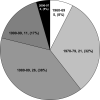American Society for Radiation Oncology (ASTRO) survey of radiation biology educators in U.S. and Canadian radiation oncology residency programs
- PMID: 19733012
- PMCID: PMC3616620
- DOI: 10.1016/j.ijrobp.2009.05.009
American Society for Radiation Oncology (ASTRO) survey of radiation biology educators in U.S. and Canadian radiation oncology residency programs
Abstract
Purpose: To obtain, in a survey-based study, detailed information on the faculty currently responsible for teaching radiation biology courses to radiation oncology residents in the United States and Canada.
Methods and materials: In March-December 2007 a survey questionnaire was sent to faculty having primary responsibility for teaching radiation biology to residents in 93 radiation oncology residency programs in the United States and Canada.
Results: The responses to this survey document the aging of the faculty who have primary responsibility for teaching radiation biology to radiation oncology residents. The survey found a dramatic decline with time in the percentage of educators whose graduate training was in radiation biology. A significant number of the educators responsible for teaching radiation biology were not fully acquainted with the radiation sciences, either through training or practical application. In addition, many were unfamiliar with some of the organizations setting policies and requirements for resident education. Freely available tools, such as the American Society for Radiation Oncology (ASTRO) Radiation and Cancer Biology Practice Examination and Study Guides, were widely used by residents and educators. Consolidation of resident courses or use of a national radiation biology review course was viewed as unlikely by most programs.
Conclusions: A high priority should be given to the development of comprehensive teaching tools to assist those individuals who have responsibility for teaching radiation biology courses but who do not have an extensive background in critical areas of radiobiology related to radiation oncology. These findings also suggest a need for new graduate programs in radiobiology.
Figures






References
-
- Hall EJ, Denekamp J. Residency training in radiation oncology; radiation biology and cancer biology. Int J Radiat Oncol Biol Phys. 1992;24:847–849. - PubMed
-
- Coleman CN, Griffin TW, Prosnitz LR, et al. Training the radiation oncologist for the twenty-first century. Int J Radiat Oncol Biol Phys. 1996;35:821–826. - PubMed
-
- Hussey DH, Sagerman RH, Halberg F, et al. Report of the 1997 SCAROP survey on resident training. Society of Chairmen of Academic Radiation Oncology Programs. Acad Radiol. 2000;7:176–183. - PubMed
Publication types
MeSH terms
Grants and funding
LinkOut - more resources
Full Text Sources

